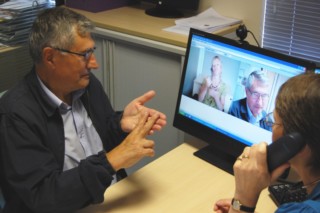 More than half of Britons ignore potentially serious health problems in the hope that they will go away. Others worry about wasting GPs time and still more are too embarrassed to visit a doctor.
More than half of Britons ignore potentially serious health problems in the hope that they will go away. Others worry about wasting GPs time and still more are too embarrassed to visit a doctor.
Tag Archives: GP
Internet based interpreting service saved a man’s life
 If we needed any further proof of how important the internet has become, this is it…
If we needed any further proof of how important the internet has become, this is it…
Deaf patient Bartholomew Kelley usually asked his daughter to interpret on any visits to the Doctors. But he suddenly became ill while his daughter was away on holiday and he knew he couldn’t put off going to see his GP. He was suffering from chest pains.
When he turned up at his surgery without an appointment, Dr Shaikh of the Peel Precinct Surgery in Carlton Vale London used an online sign language service to diagnose a serious heart condition.
Bartholomew is profoundly deaf and his first language is British Sign Language [BSL]. Luckily for Bartholomew, Dr Shaikh had very recently set up his surgery to use an on-line interpreting service, SignTranslate, which uses a simple webcam to link with a live qualified BSL interpreter. The Doctor speaks to the interpreter on the phone, and the interpreter and Deaf patient sign the conversation.
Dr Shaikh said “It was brilliant. As soon as Bartholomew started telling me through the interpreter about his symptoms I realised that his chest pains were serious. I called an ambulance and got him into hospital”. The whole process took less than 10 minutes.
The translation service, SignTranslate, is owned by healthcare charity for the Deaf, SignHealth. SignHealth is a UK charity focused on improving the mental and physical health of Deaf people.
Chief Executive of SignHealth, Steve Powell, said that Bartholomew’s situation was not a unique one;
“Every day a Deaf person will attend a health consultation with no interpreter, often relying on family or friends to communicate a diagnosis or treatment. We know that inadequate communication presents a risk to a Deaf patient and we also know that interpreters are rarely available for same day or urgent appointments. Bartholomew was lucky that his GP had an on-line solution to hand.”
All surgeries in the country already have access to the service, free of charge; they just pay a small charge for the online minutes used.
The only technology needed to use the service is broadband internet and a webcam, so it is extremely accessible for anyone with a computer.
If you would like to find out more about SignHealth or their brilliant translation service SignTranslate, please visit www.signhealth.org.uk or www.signtranslate.com

